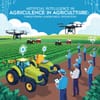The integration of artificial intelligence (AI) in agriculture is revolutionizing the way agribusinesses operate. By leveraging AI technologies, farmers and agricultural companies can improve crop yields, reduce waste, and optimize resources. AI-powered systems can analyze vast amounts of data, including weather patterns, soil conditions, and crop health, to provide valuable insights and predictions.
AI applications in agriculture include precision farming, crop monitoring, and predictive analytics. These technologies enable farmers to make data-driven decisions, reducing the risk of crop failure and improving overall productivity. AI-powered drones and satellite imaging can also help detect crop diseases and pests, allowing for targeted interventions.
The benefits of AI in agriculture are numerous, including increased efficiency, reduced costs, and improved sustainability. By adopting AI-powered solutions, agribusinesses can optimize their operations, reduce environmental impact, and improve food security. As the global population continues to grow, the use of AI in agriculture will become increasingly important for meeting the world's food needs.


